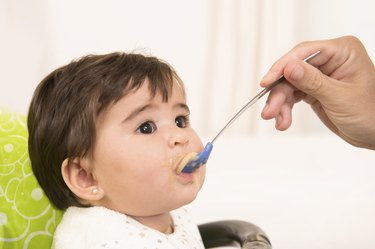
Any substance can cause an allergic reaction in a baby. Doctors often recommend rice cereal as a perfect first food because wheat makes the list of the eight top allergenic foods, according to MayoClinic.com. But rice can trigger allergic reactions in susceptible infants. Between 2 and 4 percent of children have food allergies, the According to the American Academy of Allergy, Asthma and Immunology reports.
Causes
Video of the Day
Allergic food reactions occur when your baby's immune system decides that he's eaten a foreign and potentially harmful substance. His immune system creates Immunoglobulin E antibodies that attack the substance. Allergic reactions don't usually happen on the first exposure to a food, because he hasn't created any antibodies yet. But the second time he eats rice cereal, he may have an allergic reaction.
Video of the Day
Symptoms
Rice allergy can manifest as a skin rash, red eyes, a red rash around the anus, hives, dermatitis or facial swelling. An allergy can also cause respiratory illness, with wheezing, runny nose, stuffiness or coughing. Gastrointestinal symptoms such as vomiting or diarrhea can also indicate a rice allergy. Rice can trigger an immune reaction known as food protein-induced enterocolitis syndrome, or FPIES. FPIES is a cell-mediated reaction rather than an IgE reaction; antibodies do not form and the reaction may occur on the first exposure.
Prevalence
Rice allergy affects adults more often than children. Frequent exposure to a food increases the risk of developing an allergy to it. In the United States, rice is not a common allergen, but in Japan, where rice is eaten frequently, 10 percent of the population has a rice allergy, according to gulfMD.
Considerations
To avoid allergies, the American Academy of Pediatrics recommends starting solid food between the ages of 4 and 6 months after breastfeeding exclusively until that age. Many children with rice allergies also have allergies to peaches and apples as well as other grains. Children with FPIES may also react to cow's milk or soy.